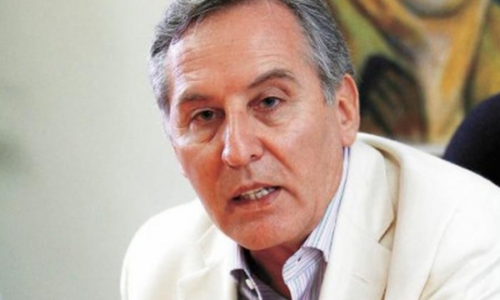
The diplomat made observations about the country’s foreign service and proposed ways in which the national diplomatic service can be redirected. He recommends that we leave our ostracism and open ourselves up to the world.

24 December 2022
Javier Viscarra, a diplomat and former official of the Ministry of Foreign Affairs, states that the national foreign service is going through its worst moment. He assures that what is happening today has not happened “even during times of military dictatorship.”
In an interview with Página Siete, Viscarra made several observations about the management of the country’s foreign policy. He also spoke about the need to redirect the diplomatic service for the benefit of Bolivia.”
It was proposed that there should be an institutionalized diplomatic service, what is your opinion on this? How should this process be carried out?
The country needs to start a strong foray into various economic processes, we must leave the ostracism to which the ideologization of our international relations has subjected us and open ourselves up to the world.
We are not observers in the economic and trade integration mechanism of the Pacific Alliance, in which Peru, Chile, Colombia, and Mexico negotiate with one of the most important markets in the world, Asia.
How should the restructuring of the Ministry of Foreign Affairs be?
It is possible to work based on many of the current diplomatic professionals, but above all, within the framework of Law 465, which is very clear. It is urgent to rethink the return to the institutionalization of the Ministry of Foreign Affairs and have a serious diplomatic corps.
I also believe that we should not cling to centralizing thinking and stop thinking that only in La Paz are there diplomats. There are professionals throughout the country. In Santa Cruz, some universities offer an International Relations major.
What government do you consider to be the worst moment for the foreign service?
The issue does not cross the government’s mind, but rather the perspective of the Ministry of Foreign Affairs, and the worst moment is that of the current Minister, Rogelio Mayta, who is not doing the Government of President Luis Arce any good. What is happening to Bolivian diplomacy today did not happen even in the worst military dictatorships.
Bolivia abstained from voting against the war in Ukraine, how does this type of action leave us internationally?
The strabismus suffered by Bolivian diplomacy is worrying. On the one hand, we consider ourselves to be a pacifist country, as our Constitution states, and on the other hand, we abstain from condemning the aggression of one country against another.
Again we fall into the submission imposed on us by certain international actors. These powers use us when they want our vote in international forums, and unfortunately, our Ministry of Foreign Affairs submits and votes in their favor.
Bolivia did not vote against Iran at the UN for the repression of recent protests. Will this type of action have consequences for the country on the international stage?
Bolivia should have clearly expressed its indignation at the death of a young woman for not properly wearing the veil covering her head. The international pressure has been so strong that Iran has ended up reconsidering the continuation of its moral police.
What do you think of Bolivia’s stance on the crisis in Peru?
I believe that this is another incomplete reading of the facts, influenced again by a political line rather than concrete facts. It has been an unfortunate decision to join Mexico, Colombia, and Argentina in a joint statement saying that the former Peruvian president was a victim of “antidemocratic harassment.”
What is the difference between the old Diplomatic Academy and the current one?
The first difference is that there used to be a Diplomatic Academy, but now there isn’t. Before, there was a focus on excellence in training through agreements with major universities so that the curriculum was recognized. Today, training is reduced to a few hours in courses offered by the Plurinational Public Management School, so that “new diplomats” can perform duties in the central service and in our embassies. It goes without saying that the expected result of such improvisation is questionable.
Was it a mistake to judicially address the maritime issue?
I believe that the biggest mistake was not considering the overall picture of international relations and public international law, which probably was not ready to admit this new international law on which Bolivia based its claim. But it was not just this lack of perspective; it was also the failure to continue exploring other diplomatic alternatives instead of submitting our maritime cause to judicial proceedings, only because of the dictates of the country’s internal politics.
Javier Viscarra, Diplomat.




